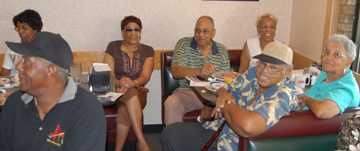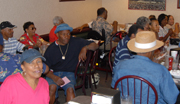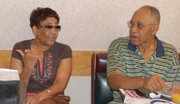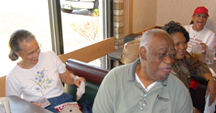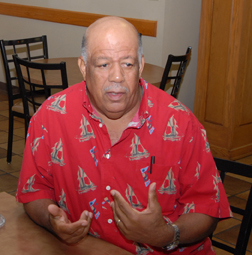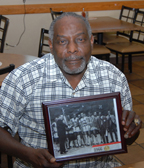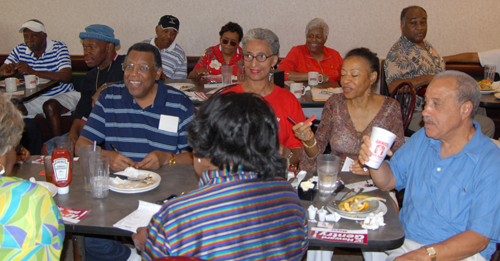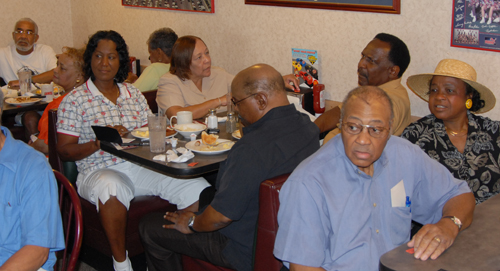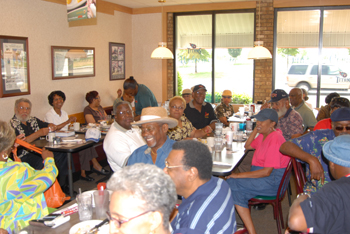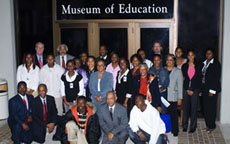

The Pearl High School Alumni Association |
||||||||||||||||||||||||
|
||||||||||||||||||||||||
|
||||||||||||||||||||||||
|
The Significance of the “For more than 100 years now families that attended Pearl High School found a common sense of togetherness that radiates even today with those who are still living. The Alumni Association continues to share that same common bond of family, friends, and classmates.” |
|||||||||||||||||||||||
Determining the success of any school program remains difficult even for educational evaluators who are attempting to ascertain changes in student knowledge from one year to the next. The task becomes somewhat impossible when one examines a school’s program from 50 years ago. Was Pearl High School an outstanding school? Certainly. Was the program distinguished? Absolutely. Responses become more difficult, however, when one then asks just how outstanding and distinguished? Typically, notable and “famous” graduates are listed, offering little but anecdotal perspectives on the success of the academic curriculum, sports program, and cultural activities. More scientific measurements are equally inadequate as seen by the applauded but conceptually flawed efforts of Margaret Willis who in the 1950s attempted to discern the influence and impact of progressive education, after twenty years, with her illustrative 1938 high school graduating class of “guinea pigs.” (1) Knowing the difficulties and ill-fated attempts to evaluate the curricula and students from the participating Eight Year Study schools, the principals of the Secondary School Study were adamant at the beginning of the project to insist that their programs would not be judged or compared. Their wisdom was followed then as we shall do so now. |
||||||||||||||||||||||||
| As is standard practice with most alumni associations, their monthly gatherings include a moment of silence for those classmates who have recently passed or who are battling health problems. They laugh, they joke, they reminiscence. Month after month, from 40-70 graduates come together as community during the many intervening years from their high school graduation. They arrive to talk, to help, to support classmates as was the case in June 2007, on my occasion to attend, when Pearl graduate Howard Gentry was engaged in a close race for the mayor of Nashville. |
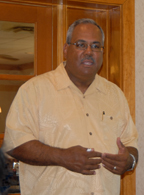 Howard Gentry |
|||||||||||||||||||||||
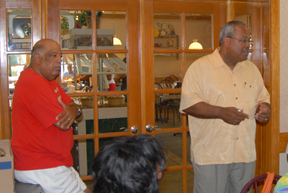 Melvin Black and Howard Gentry at an alumni meeting |
||||||||||||||||||||||||
A moment never forgotten: the 1966 Pearl High School State Basketball Champions with their 31-0 perfect season. |
||||||||||||||||||||||||
These monthly gatherings of good will and camaraderie, as well as their summer alumni reunions, are not the only activities of the alumni association, however. Margaret McClain and others are actively involved in service projects for the Martin Luther King Jr. Magnet at Pearl High School as well as initiating fund-raising activities for extra-curricular programs.
|
||||||||||||||||||||||||
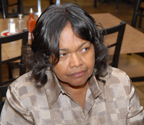 Margaret McClain |
||||||||||||||||||||||||
“If the legacy of a school rests with its students, then the Secondary School Study staff and teachers would be quite proud of the spirit of community, cooperation, and democracy that was instilled at Pearl High School.” |
||||||||||||||||||||||||
A monthly meeting of “We have never forgotten the love and passion |
||||||||||||||||||||||||
|
||||||||||||||||||||||||
Back table, l-r: Wilbert Smith, James Dean, Sam Jordon, Shirley Jordan, Alice Epperson, Lorenza Hill; Front table: Richard Jones, Audrey Hall, Margarette Chesser, James Campbell |
||||||||||||||||||||||||
|
||||||||||||||||||||||||
Back booth: Steve Burton, Annie Cleggett; Eula Black; Middle booth: Patricia Gregory; Mary Avant; Richard Coleman; Archie Avant; Right booth: Nathaniel Moore; Francis Reed |
||||||||||||||||||||||||
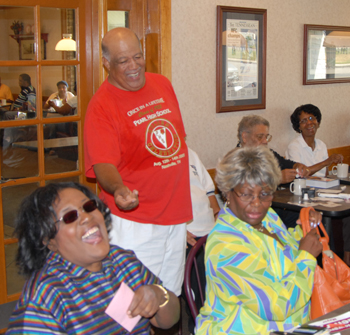 |
||||||||||||||||||||||||
| Front row: Ann Brooke, Hattie Conn; Back row: Melvin Black, W. C. Copeland, Janice Beason | ||||||||||||||||||||||||
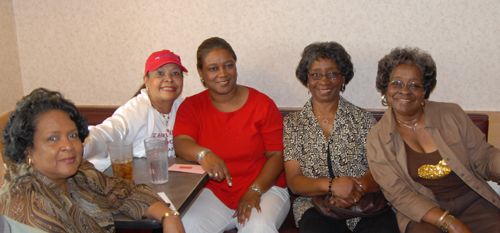 |
||||||||||||||||||||||||
l-r: Barbara Jones, Palice McCuthchen, Varleen Smith, Shirley Stuart, Murray Dowell |
||||||||||||||||||||||||
|
||||||||||||||||||||||||
Left table: Fenecia Briggance, Daniel Ewing, Bernice Smartt; back by window: Teddy Acklen Middle table front: Audrey Hall, Richard Jones, Leonard Epperson; Middle table back: Dorothy Whitmore, Andrew Pye, Doris Smith, Marva Wade, Richard Hancock, Lorenzo Haden, Mary Hayden |
||||||||||||||||||||||||
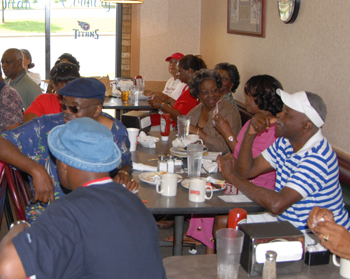 |
||||||||||||||||||||||||
Left of table: James Dean, Bob Smith, Lauree Childress, Barbara Jones; Right of table: Palice McCuthchen, Varleen Smith, Shirley Stuart, Murray Dowell, Dezora Thomas, Wilbert Smith |
||||||||||||||||||||||||
Endnotes: |
||||||||||||||||||||||||

an institutional member of the International Coalition of Sites of Conscience
Museumofed@gmail.com

